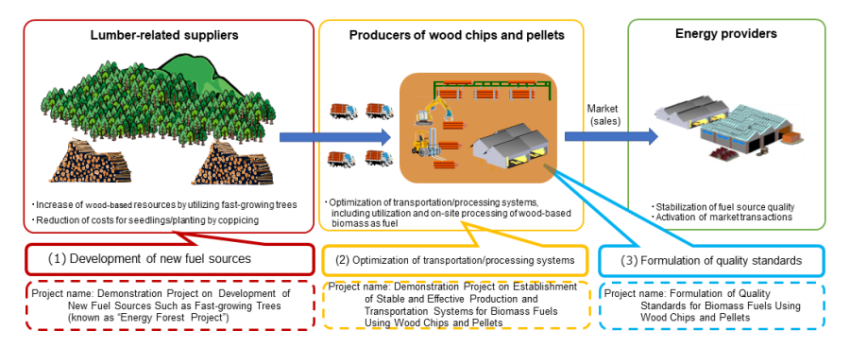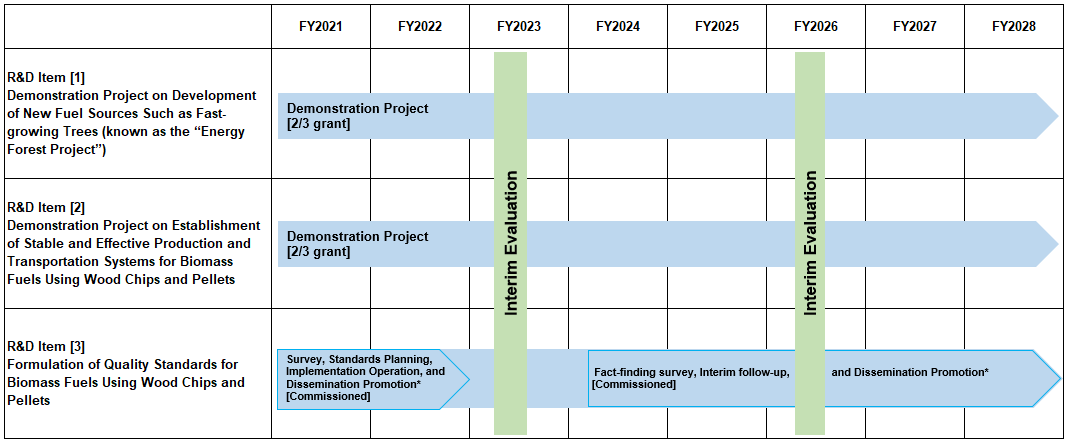Support Project for Creating Stable and Effective Supply Systems of Woody Biomass Fuels
Project overview
Encouraging to use of wood-based energy, NEDO recognizes Stable and Effective Supply Systems for Woody Biomass fuels that make it sustainable and prosperous for entities of both forestry and power plants are under development, and the absence of the quality standard in business practice among them is an obstacle.
In this context, NEDO will encourage positive initiatives rooted in local communities, and contribute to the expansion of woody biomass energy use through the following activities under this project: "Demonstration Project on Development of New Fuel Sources Such as Fast-growing Trees (known as the “Energy Forest Project”)," "Demonstration Project on Establishment of Stable and Effective Production and Transportation Systems for Biomass Fuels Using Wood Chips and Pellets," and "Formulation of Quality Standards for Biomass Fuels Using Wood Chips and Pellets."
Research and Development
R&D Item [1] Demonstration Project on Development of New Fuel Sources Such as Fast-growing Trees (known as the “Energy Forest Project”)
It is significant to utilize woody biomass for promoting the use of biomass energy. Even when the woody biomass is grouped together, [1] coniferous trees and [2] broadleaf trees have very different vegetation. Therefore, it is necessary to take measures according to the respective issues. In this item, NEDO will select the methods for harvesting and delivery of trees in addition to afforestation and silviculture suitable for regions, which are divided into six climate classifications in Japan: subarctic (northern and southern regions), temperate eastern Japan (Sea of Japan and Pacific Ocean sides), temperate western Japan, and inland climate, with the aim of expanding utilization of fast-growing trees and other species. Specifically, NEDO will demonstrate how to optimize the production system by reducing the number of cleaning and cutting underbrush away and reducing costs with natural sprouting. Also, NEDO supports development of elemental technologies (e.g. forestry machines and materials) contribute to reducing cost for silviculture of Fast-growing Trees.
R&D Item [2] "Demonstration Project on Establishment of Stable and Effective Production and Transportation Systems for Biomass Fuels Using Wood Chips and Pellets"
NEDO will accelerate efforts to establish a stable and efficient supply and utilization system for woody biomass fuel that enables forests and forestry industries to coexist with biomass power generation projects in a sustainable manner. In addition, NEDO will consider whether it should conduct projects related to the identification and verification of issues or other measures as necessary.
R&D Item [3] "Formulation of Quality Standards for Biomass Fuels Using Wood Chips and Pellets"
This item aims to revitalize market transactions and improve power generation efficiency by establishing quality standards for woody biomass fuels (chips and pellets) in terms of moisture content, size, ash concentration, and other factors in addition to other means, and promote understanding of this project by accelerate discussion among woody biomass suppliers, fuel producers (chips and pellets) and energy providers (electricity and heat) through holding opportunities, such as workshops and symposiums. Also, the handbook of technical guidelines shall be provided.
![Map of Japan showing the six climate classifications of Japan as described in the demonstration on Energy Forest Project under the R&D Item [1]](/content/100972622.png)
Climate classification of the demonstration on the "Energy Forest Project"
Project Manager
YANO Takahisa, Senior Director
Outcome Target
Increase in fuel material resources:
Increase of 50,000 dry tons/year in FY2028 (interim year for the target) and 110,000 dry tons/year in FY2032 (final year for the target)
Cost reduction of fuel material:
30% reduction in the transaction price of fuel materials from the current level in FY2032 through reductions associated with the overall optimization such as forestry costs, labor costs, production costs, and transportation costs.
Quality stabilization of fuel material and activation of market transactions:
Encouraging appropriate transaction practices where quality standards and prices are tied together, for example, moisture content, can be reflected in fuel prices in FY2032 by establishing and promoting a system to evaluate fuel quality in an integrated manner. Specifically, the developed standards must be endorsed by two industry associations.
Output Target
- Adopting the six Japanese climate classifications so that the demonstration can be conducted in each category, which takes into account differences in tree species and other factors.
- At least one case per process (production and transportation) and fuel types (chips and pellets) shall be adopted.
- Two quality standards will be developed.
Project Process Control Chart
Basic information
| Technical field |
|
|---|---|
| Project code | P21002 |
| Department in charge |
|
Last Updated : May 28, 2025


